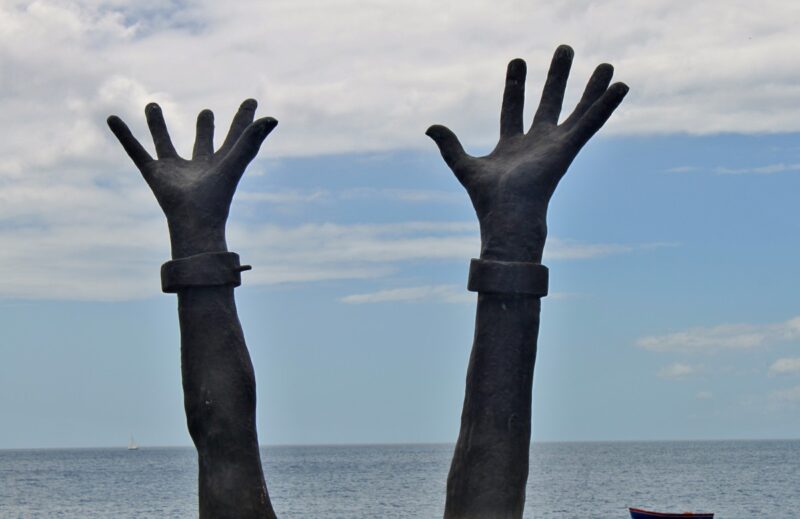Martin Luther King Jr., in his famous “I Have a Dream Speech,” given August 28, 1963, spoke to hundreds of thousands gathered on the Washington Mall. But he actually addressed all Americans and the world.
Like William Wilberforce in a previous generation, who called the world to consciousness of the moral evil of slavery and racism, Dr. King called the United States and all humankind to honor the God-given principles of dignity and freedom.
 When we let freedom ring from every village and every hamlet, from every state and every city, we will be able to speed up that day when all of God’s children, black men and white men, Jews and Gentiles, Protestants and Catholics, will be able to join hands and sing in the words of the old Negro spiritual: “Free at last! Free at last! Thank God Almighty, we are free at last!”
When we let freedom ring from every village and every hamlet, from every state and every city, we will be able to speed up that day when all of God’s children, black men and white men, Jews and Gentiles, Protestants and Catholics, will be able to join hands and sing in the words of the old Negro spiritual: “Free at last! Free at last! Thank God Almighty, we are free at last!”
When I listened to the speech as a nineteen-year-old I was moved to the core of my being. Dr. King’s words shaped my life toward social activism, helped me find my own calling to fight against poverty and for the dignity of every human being. As I read Dr. King’s words again today, I am moved to tears.
Suffering can be redemptive
In this incredible speech Dr. King brought the nation to see clearly her failures and shortcomings, and to remind us as Americans of the need to cash the promissory note of our founding documents. In addition, he reminded us that to cash that promissory note would bring suffering, but that the suffering could be redemptive.
I am not unmindful that some of you have come here out of great trials and tribulations. Some of you have come fresh from narrow jail cells. And some of you have come from areas where your quest — quest for freedom left you battered by the storms of persecution and staggered by the winds of police brutality. You have been the veterans of creative suffering. Continue to work with the faith that unearned suffering is redemptive.
His phrase “unearned suffering is redemptive” jumped out at me! Out of that kind of suffering comes something new, something redemptive. This indeed is a reminder of the finished work of Christ. Out of His suffering on the cross came redemption for all mankind. Whether voluntary or involuntary, undeserved suffering has a redemptive element.
Christ endured redemptive suffering, he modeled it for us and he called us to a life of such suffering.
And calling the crowd to him with his disciples, he said to them, “If anyone would come after me, let him deny himself and take up his cross and follow me. For whoever would save his life will lose it, but whoever loses his life for my sake and the gospel’s will save it. For what does it profit a man to gain the whole world and forfeit his soul? For what can a man give in return for his soul?” Mark 8:34-37
Suffering in the cause of justice
We are to follow Jesus, to willingly take mistreatment because in suffering the consequences of someone else’s sin there is redemption. We are to walk with others who are being unjustly treated.
Redemptive suffering is a hallmark in both Catholic and Protestant traditions. As Protestants assert, “redemptive suffering is that voluntarily undertaken in the cause of justice and the effort to combat disease.”[1]
The Catholic Church has a strong tradition in redemptive suffering. The Catholic Catechism states:
 Moved by so much suffering Christ not only allows himself to be touched by the sick, but he makes their miseries his own: “He took our infirmities and bore our diseases.” But he did not heal all the sick. His healings were signs of the coming of the Kingdom of God. They announced a more radical healing: the victory over sin and death through his Passover. On the cross Christ took upon himself the whole weight of evil and took away the “sin of the world,” of which illness is only a consequence. By his passion and death on the cross Christ has given a new meaning to suffering: it can henceforth configure us to him and unite us with his redemptive Passion.[2]
Moved by so much suffering Christ not only allows himself to be touched by the sick, but he makes their miseries his own: “He took our infirmities and bore our diseases.” But he did not heal all the sick. His healings were signs of the coming of the Kingdom of God. They announced a more radical healing: the victory over sin and death through his Passover. On the cross Christ took upon himself the whole weight of evil and took away the “sin of the world,” of which illness is only a consequence. By his passion and death on the cross Christ has given a new meaning to suffering: it can henceforth configure us to him and unite us with his redemptive Passion.[2]
We can voluntarily carry the weight of injustice in our own lives and bodies, a choice which can lead to redemptive action. Or we can put the weight of injustice on the party responsible and force them to pay the price of the injustice they put on us.
Suffering with “the least of these”
Christ took on the weight of our sin, so we might not pay the price ourselves. Redemptive suffering takes on the consequences of someone else’s sin. This has a redemptive effect in the believer’s life, a step toward the goal of becoming “perfect and complete lacking in nothing” as James puts it. It also affords the perpetrator an opportunity to change, to make amends, a small yet powerful echo of the redemption offered to the sinner by the work of Christ.
In Matt 25:40-45, all humans stand before the judgment seat of Christ where he separates the sheep—“you who are blessed by my Father,” from the goats—“you cursed.” The sheep inherit the kingdom, the goats are sent “into the eternal fire.” And what is the dividing line between the sheep and the goats? Compassion. Those who suffered-together-with “the least of these” Jesus regards as sheep.
And the King will answer them, ‘Truly, I say to you, as you did it to one of the least of these my brothers, you did it to me.’
“Then he will say to those on his left, ‘Depart from me, you cursed, into the eternal fire prepared for the devil and his angels. For I was hungry and you gave me no food, I was thirsty and you gave me no drink, I was a stranger and you did not welcome me, naked and you did not clothe me, sick and in prison and you did not visit me.’ Then they also will answer, saying, ‘Lord, when did we see you hungry or thirsty or a stranger or naked or sick or in prison, and did not minister to you?’ Then he will answer them, saying, ‘Truly, I say to you, as you did not do it to one of the least of these, you did not do it to me.’”
Through tribulations we enter the kingdom of God
Luke writes of redemptive suffering in his history of the early church in Acts 14:22: “… strengthening the souls of the disciples, encouraging them to continue in the faith, and saying that through many tribulations we must enter the kingdom of God.”
Through Christ’s tribulation we enter the Kingdom of God, and often our own tribulations are part of the picture as well. Our justification is by the finished work of Christ alone, but Paul admonishes us to “work out your own salvation with fear and trembling.” The process of sanctification often requires passing through fire, sometimes suffering unjustly. This suffering can be redemptive.
- Darrow Miller
… to be continued
[1] Lebacqz, Karen (29 August 2014). “Redemptive Suffering Redeemed”. Suffering and Bioethics: 262–274. doi:10.1093/acprof:oso/9780199926176.003.0013.
[2] Catechism of the Catholic Church. p. Paragraph 1505. Retrieved 9 January 2021





